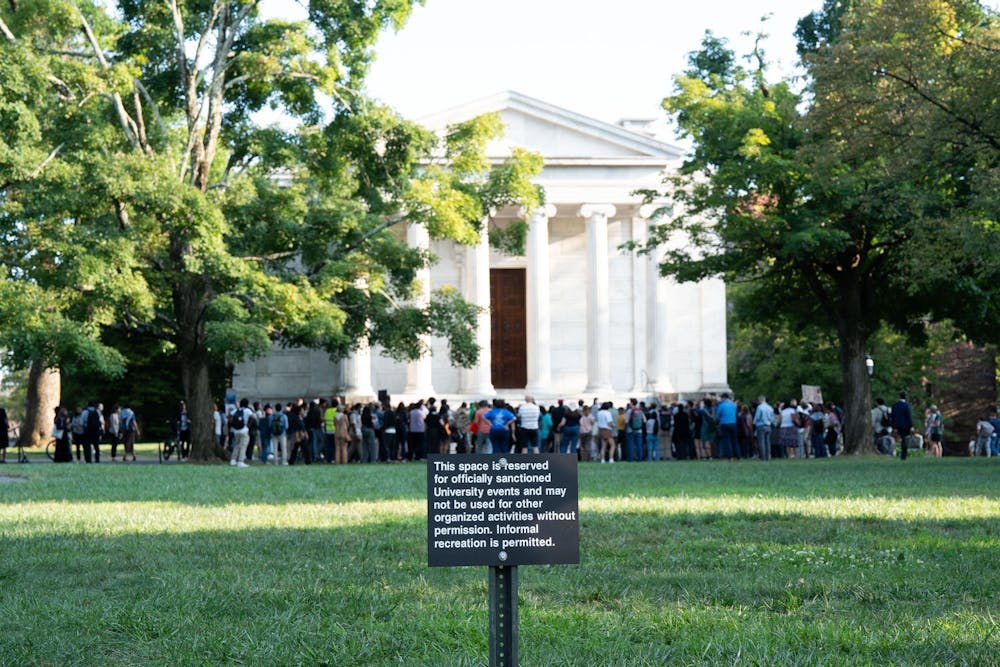Following the first day of classes, pro-Palestine organizers held the first protest of the academic year. Around 150 demonstrators attended, touring many of the major sites of Princeton’s “Gaza Solidarity Encampment” from the spring semester, starting the march on McCosh Courtyard before moving to the front of Clio Hall and Nassau Hall.
The protest comes amid a newly launched University website on protests addressing frequently asked questions regarding time, place, and manner restrictions, including tightened protest regulations. The newest rules introduced were a recurring topic of the protest, although administrators have asserted that the website introduces no significant changes to the University’s rules.
“We have tried to follow the University’s process, and they’ve shifted the goalposts,” Urvi Kumbhat GS, an organizer of Princeton Israeli Apartheid Divest (PIAD), said. “Today we played by the rules … [but] I would say we’re not deterred.”
Others took a more defiant stance on the updated protest rules, which explicitly prohibit demonstrations on Cannon Green and the lawn in front of Nassau Hall.
“If somebody from the administration comes over and says, ‘here’s a little sheet of paper; you’re walking on the grass,’ I want you to go find [a protest marshal] and tell them, tell this guy to f--- off,” Aditi Rao GS told the crowd, referencing small sheets of paper that protesters have received in the past from free expression coordinators.
The administration has pushed back on these claims, stating that the website’s launch was intended to make regulations more accessible.
“You may be wondering whether Princeton’s policies relating to protests and demonstrations will change in light of last year’s activity. The short answer is: no,” top University officials, including Vice President for Campus Life W. Rochelle Calhoun and Dean of the College Michael Gordin, wrote to students and affiliates Tuesday morning.
“The goal of this site is to increase awareness and understanding in the community about Princeton’s protest policies. It also serves an important role by reminding community members about policies that apply to them,” they added.
The protest saw a noticeable gathering of PSAFE officers ahead of the event, a departure from other similarly sized protests that took place before such activities heated up towards the end of the spring semester.
During Tuesday’s protest, protesters walked the perimeter of Cannon Green, but never stepped over the lawn’s landscape chain. Some of the speeches promised more escalation and increased pressure on the University, while others focused on the casualties wrought by the war in Gaza.
“Let’s not forget that Princeton will not stop funding this genocide until we get them to stop,” Nipuna Ginige ’26, a member of Princeton’s chapter of Students for Justice in Palestine, said. “They will not rest, until we, as a unified movement, as a unified intifada, put in the work and pressure them to disclose and divest.”
A group of a dozen counter-protesters also held signs commemorating Hersh Goldberg-Polin, a dual Israeli-American citizen who was held hostage by Hamas. His body was discovered in Gaza on Saturday.

Emanuelle Sippy ’25, the president of the Alliance of Jewish Progressives (AJP), addressed the signs in a speech to the crowd.
“My family knows Hersh’s family … I’ve eaten at his first cousin’s house. She’s hosted me many times,” she said. “It is possible to stand here and grieve the life of Hersh and also possible to stand here and grieve the lives of countless Palestinian children and parents and teachers.”

Counter-protesters at Tuesday's protest.
Calvin Grover/ The Daily Princetonian
Speakers also encouraged the crowd to attend the court hearings, which will take place on September 10, of the 13 University affiliates arrested during last spring’s protests. They previously appeared in court in July to face low-level trespassing charges.
The protests made clear that despite the long summer pause in protests, student activists on Princeton’s campus are still looking to organize.
Correction: A previous version of the piece incorrectly stated that the court appearance is scheduled for September 15 when in reality it is scheduled for September 10.
Miriam Waldvogel is an associate News editor and the investigations editor for the ‘Prince.’ She is from Stockton, Calif. and often covers campus activism and University accountability.
Christopher Bao is an assistant News editor and the accessibility director for the ‘Prince.’ He is from Princeton, N.J. and typically covers town politics and life.
Please send any corrections to corrections[at]dailyprincetonian.com.








